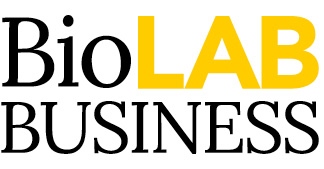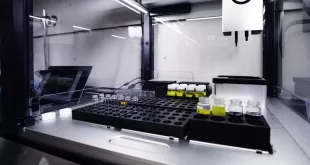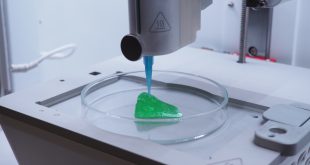By Robert Price
Canada’s lagging capacity to manufacture its own coronavirus vaccines received a shot in the arm this March with Sanofi’s announcement that it will be building a $925-million vaccine manufacturing facility in Toronto. Weeks later, the push for domestically produced vaccines was answered with a new Biologics Manufacturing Centre in Montreal and Moderna’s plans for a made-in-Canada vaccine manufacturing plant.
As vaccinations began rolling out in countries like Great Britain and the United States, Canadians were falling behind, dependent on imported vaccines that were often delayed and fell short of numbers ordered. It revealed the thinness of Canada’s vaccine manufacturing capacity. The new Sanofi facility, expected to be operational by 2026, aims to fortify that capacity by increasing the supply of influenza vaccines.
Fabien Marino, vice president industrial affairs at Sanofi, says the investment represents a shared ambition by industry and government to build “a robust domestic biomanufacturing industry in Canada.” Canadian taxpayers will contribute almost half of the $925 million needed to build the facility, a single investment which the federal government says represents one of the largest responses to threats of future pandemics.
Government spokesperson Sonia Noreau-Pérodeau points out that the COVID-19 pandemic highlighted the urgency for a strong domestic remanufacturing sector. “Investing in Sanofi helps address the need to secure a domestic partner for pandemic influenza vaccine readiness and will be key in contributing to Canada’s long-term pandemic preparedness by installing the capacity to produce pandemic influenza vaccine at population scale,” explains Noreau-Pérodeau.
John Alderdice, manager of business retention and expansion at the City of Toronto, believes the city’s well-established life science ecosystem helped to secure the Sanofi facility, ahead of other jurisdictions under consideration. “Sanofi is making a major investment in Toronto’s life sciences sector as a result of our professional and experienced talent base, the quality of graduates from area universities, as well as the excellence of Toronto’s scientific infrastructure, shared facilities and clinical research organizations,” says Alderdice.
In addition to Toronto’s Imagination, Manufacturing, Innovation and Technology Program, the municipality also works with other levels of government to help companies access relevant investments and supports. Alderdice explains, “This cooperative approach has helped the city secure major investments in facilities and encourage national networks to headquarter here.”
The robustness at the planned Sanofi facility comes in part from new technologies, including robotics, machine learning and improved data analytics. The company says these technologies will lend agility to its operations and help the company pivot to produce medicines when new emergencies arise; it fits into global efforts to increase flexibility and capacity in pandemic preparedness. “The COVID-19 pandemic is a perfect illustration of the global effort required, from the life sciences sector, public health institutions, governments, academia and the public to conquer this and other virulent diseases,” says Marino.
As part of this global effort, in March the federal government announced investments into vaccine production at the University of Saskatchewan’s infectious disease research centre, VIDO-InterVac. The centre received $12 million to expand its vaccine manufacturing capacity, as well as $11.3 million for continued operational funding for its high-containment laboratories.
“The $12 million enables us to build the facility to Good Manufacturing Practices standards as required for human vaccine production,” said VIDO-InterVac Director Volker Gerdts. “We expect to begin vaccine production in a little more than a year.”
The Government of Saskatchewan also injected $400,000 for VIDO-InterVac’s manufacturing facility.
Joining the push for domestically produced vaccines, construction of the new Biologics Manufacturing Centre in Montreal was completed this June, 10 months after breaking ground. Once it is fully licensed and operational, the Biologics Manufacturing Centre will be able to produce cell-based biopharmaceuticals like vaccines and other biologics, including viral vector, protein subunit, virus-like particles and other recombinant proteins.
This August, biotech giant Moderna announced it would be working with the Canadian government to build a state-of-the-art messenger RNA (mRNA) vaccine manufacturing facility in Canada. The collaboration aims to provide Canadians with access to domestically manufactured mRNA vaccines against respiratory viruses including COVID-19, seasonal influenza, respiratory syncytial virus (RSV) and potential others.
Stéphane Bancel, CEO of Moderna, said, “As a company, we are committed to global public health. While we are still responding to this pandemic, we also want to ensure we and society learn from it. As Moderna expands internationally, we are delighted to bring mRNA manufacturing to Canada. We believe that this innovative business model will have global impact and implications.”
Other projects are also underway to achieve this goal. One of the largest involves Quebec-based biopharmaceutical company Medicago, which has experience developing rapid responses to emerging viruses, such as Ebola and H1N1. The company has received $173 million in federal funding to move ahead with its COVID-19 vaccine research, and to establish a large-scale Canadian manufacturing facility in Quebec City. By the end of 2023, Medicago expects to be making vaccines from start to finish in the new manufacturing plant in the eastern part of Quebec City.
 BioLab Business Magazine Together, we reach farther into the Canadian Science community
BioLab Business Magazine Together, we reach farther into the Canadian Science community





